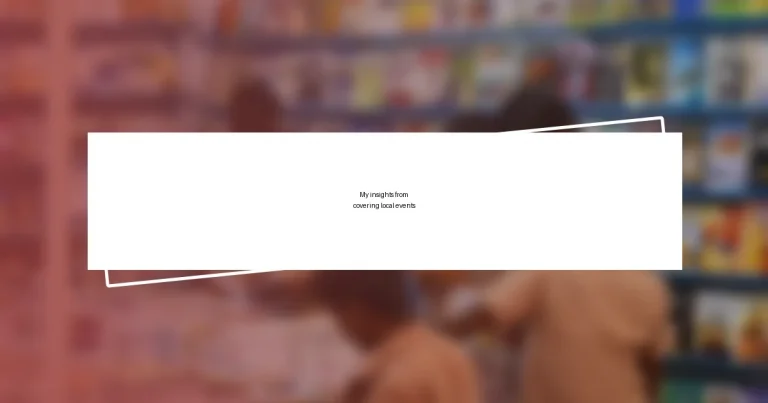Key takeaways:
- Local events, like art fairs and farmers markets, foster community bonds and highlight local culture, enhancing a sense of belonging.
- Effective event coverage involves preparation, engagement with attendees, and storytelling to capture the emotional essence of the events.
- Building relationships with event organizers can lead to deeper insights and collaborative opportunities, enriching both reporting and community connections.
- Social media amplifies event exposure and facilitates community interaction, encouraging storytelling that resonates emotionally with a wider audience.
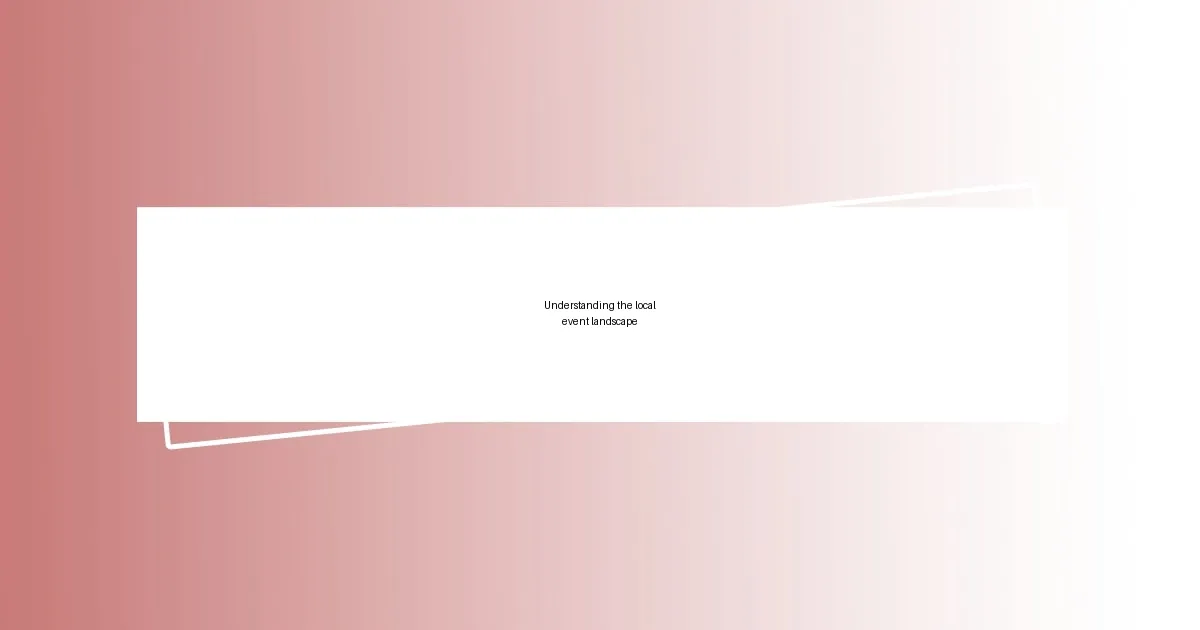
Understanding the local event landscape
Diving into the local event landscape has been an eye-opener for me. I remember attending a small art fair in my community where the vibrancy and enthusiasm of the local artists truly showcased the spirit of our area. It’s fascinating how events like these can transform a simple venue into a hub of creativity and collaboration.
While observing different types of local gatherings, I’ve learned that each event tells a story about the community it represents. Have you ever felt the buzz at a neighborhood festival, where you could almost taste the excitement in the air? I find it remarkable how these gatherings not only entertain but also strengthen community bonds, making each participant feel a part of something larger than themselves.
Understanding the local event landscape doesn’t just involve knowing what happens but also why these occasions hold significance. For instance, I attended a farmers market one sunny Saturday, and the connections made between vendors and patrons were palpable. Isn’t it incredible how such moments can foster a sense of belonging and pride in our local culture? Each event, whether large or small, offers a unique glimpse into the heartbeat of a community.
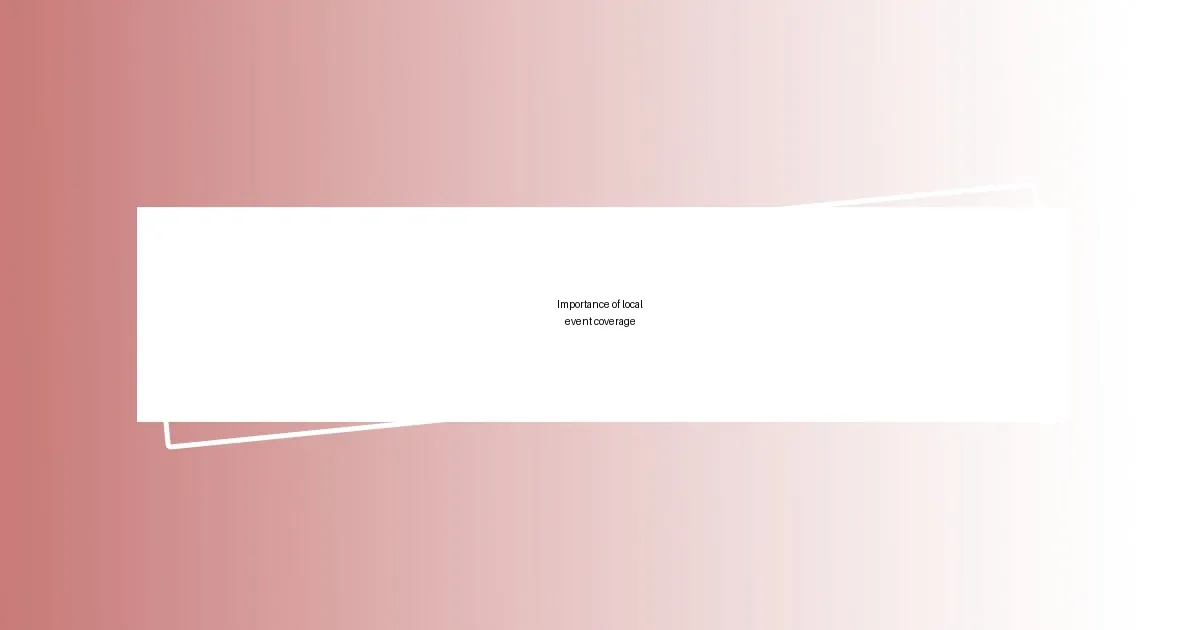
Importance of local event coverage
The importance of local event coverage cannot be overstated. From my experience, these events serve as vital windows into the community, revealing the diverse interests and passions that exist within. I clearly recall attending a neighborhood block party where I struck up conversations with longtime residents and newer families. It struck me how these interactions highlighted the tapestry of life in our hometown, creating a shared narrative that connects us all.
When I think about local events, I’m reminded of the energy and enthusiasm that fills the air. Covering these gatherings allows me to spotlight local businesses, talent, and issues that often go unnoticed. Not long ago, I found myself at a charity run where participants were not only raising awareness but also sharing heartfelt stories of why the cause mattered to them. Witnessing such emotion firsthand reinforced for me how local events can spark change and foster community ties in ways that more significant, impersonal events cannot.
Moreover, local event coverage promotes a sense of pride among residents. I remember my surprise when a local fair highlighted artisans who’ve been crafting their goods for generations. This occasion allowed those who attended to not only celebrate their heritage but also gain a newfound appreciation for what makes our community unique. Isn’t it refreshing to see your neighbors shine in the spotlight? These events are about much more than entertainment – they’re about celebrating our shared identity.
| Types of Events | Community Impact |
|---|---|
| Art Fairs | Showcase local talent and cultural heritage |
| Farmers Markets | Build relationships between producers and consumers |
| Charity Runs | Raise awareness and funds for important causes |
| Block Parties | Strengthen neighborly bonds and promote inclusivity |
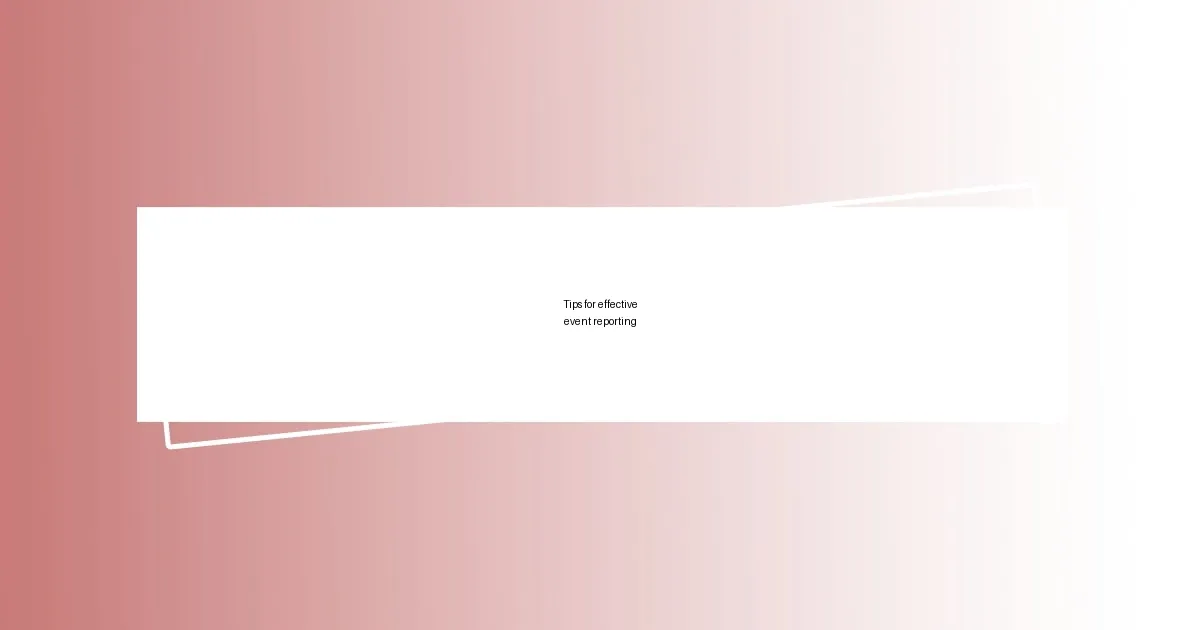
Tips for effective event reporting
When it comes to effective event reporting, preparation is key. In my own journey, I’ve found that arriving early and mingling with attendees can offer invaluable insights. I remember one time at a film festival; I took the time to chat with filmmakers before their screenings, which not only helped me gather interesting quotes but also made my reporting feel more personal and connected to the community.
Here are some practical tips to elevate your event reporting:
- Research the Event: Understand its background and significance to the community.
- Engage with Attendees: Ask questions and collect their perspectives to enrich your coverage.
- Capture Atmosphere: Use descriptive language to convey the event’s mood and energy.
- Follow Up on Social Media: Engage with event organizers and attendees post-event for additional insights.
- Highlight Key Moments: Focus on standout speeches, performances, or activities that carry emotional weight.
By incorporating these strategies into my event reporting, I’ve learned that it’s much more than just facts; it’s about telling the vibrant stories woven into the fabric of our community. One time, while covering a local concert, I was moved by the way the audience sang along; it made me reflect on how music can unite people from different walks of life in shared moments of joy.
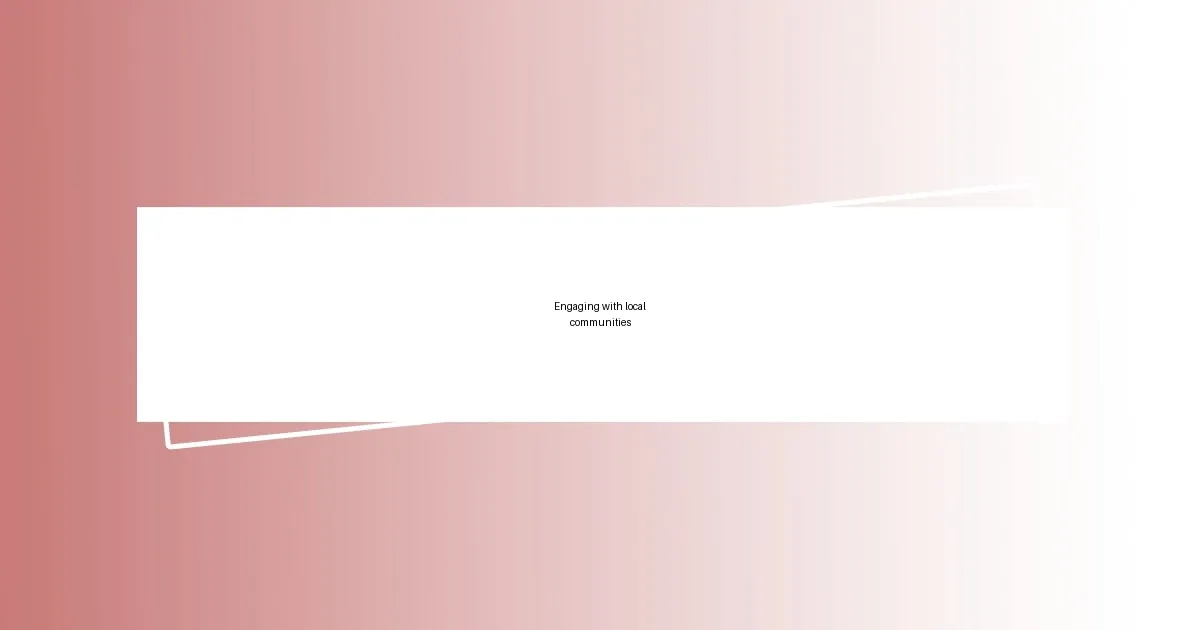
Engaging with local communities
Engaging with local communities is truly a rewarding experience. I remember attending a cultural festival where I was struck by how many generations came together to celebrate. Hearing stories from grandparents about traditions they passed down to their children reminded me of the deep roots we all have in our communities. It was a reminder that local events create spaces for shared memories and conversations that can last a lifetime.
I often find that when I engage with locals at these events, I uncover not only their stories but their hopes for the future. At a recent community garden event, I noticed how passionate volunteers were about sustainability. Their conversations sparked my curiosity; I began asking them about their challenges and successes. This kind of engagement doesn’t just make for great content— it builds relationships. Isn’t it fascinating how we can learn so much from each other just by taking the time to listen?
The emotions that unfold at local events are what truly connect us. I vividly recall a poignant moment during a charity event where a participant broke down while sharing her personal journey. Witnessing her vulnerability opened up a floodgate of empathy in those around her. This is why engaging with local communities matters: it’s about creating a supportive environment where everyone feels heard and valued. How often do we get the chance to truly understand someone else’s struggles? These events make that possible, fostering a sense of belonging that resonates deeply within our hearts.

Building relationships with event organizers
Building relationships with event organizers can be one of the most rewarding parts of covering local events. I remember the time I approached an organizer after a community fair, genuinely asking about the challenges they faced in setting it up. We ended up discussing their vision for future events, and I realized that these conversations not only deepen my understanding but also open doors for future collaborations. Isn’t it amazing how a simple question can lead to such a meaningful connection?
I’ve learned that maintaining these relationships is crucial. After one particularly successful coverage of a charity run, I reached out to the event planner to express my appreciation for their hard work. That simple acknowledgment led to an invitation to their next event and a fruitful discussion on how I could better highlight their mission in future updates. Building rapport like this has created a network of mutual trust, allowing me to gain deeper insights into the events I’m covering. How often do we reflect on the impact of a sincere gesture?
Cultivating these connections isn’t just about professional gain; it’s also about sharing a passion. During my time at a local art exhibition, I bonded with an organizer over our mutual admiration for the showcased pieces. This not only enriched my reporting but also forged a friendship based on shared values. It’s moments like these that remind me of the importance of fostering relationships; they transform my work into something more fulfilling and collaborative. What’s more rewarding than knowing the people behind the events you love?

Utilizing social media for exposure
Social media has been a game changer for gaining exposure when covering local events. During a recent music festival, I posted live updates and behind-the-scenes photos on Instagram. The immediate feedback was thrilling—people were tagging their friends and sharing my posts, creating a ripple effect that boosted attendance for the following day. Have you ever felt the excitement of your words reaching beyond your immediate circle? It’s incredibly gratifying!
What truly stands out to me is the ability to interact with the audience. After sharing a quick video of a local band’s performance, I was amazed by the flood of comments from those who missed the event. They expressed their appreciation for the coverage and even shared their own experiences. This interaction fosters a sense of community online, and it makes me feel like I’m part of something bigger. Doesn’t it feel rewarding when you can connect others through your work?
Utilizing social media for exposure isn’t merely about posting content; it’s about storytelling. I remember posting a heartfelt status about a local chef donating meals during a community event. The response was overwhelming, with shares, likes, and messages flooding in. It was a powerful reminder that when we share stories that resonate emotionally, we cultivate empathy and inspire action. Isn’t it fascinating how a single post can shine a light on the unsung heroes in our neighborhoods?
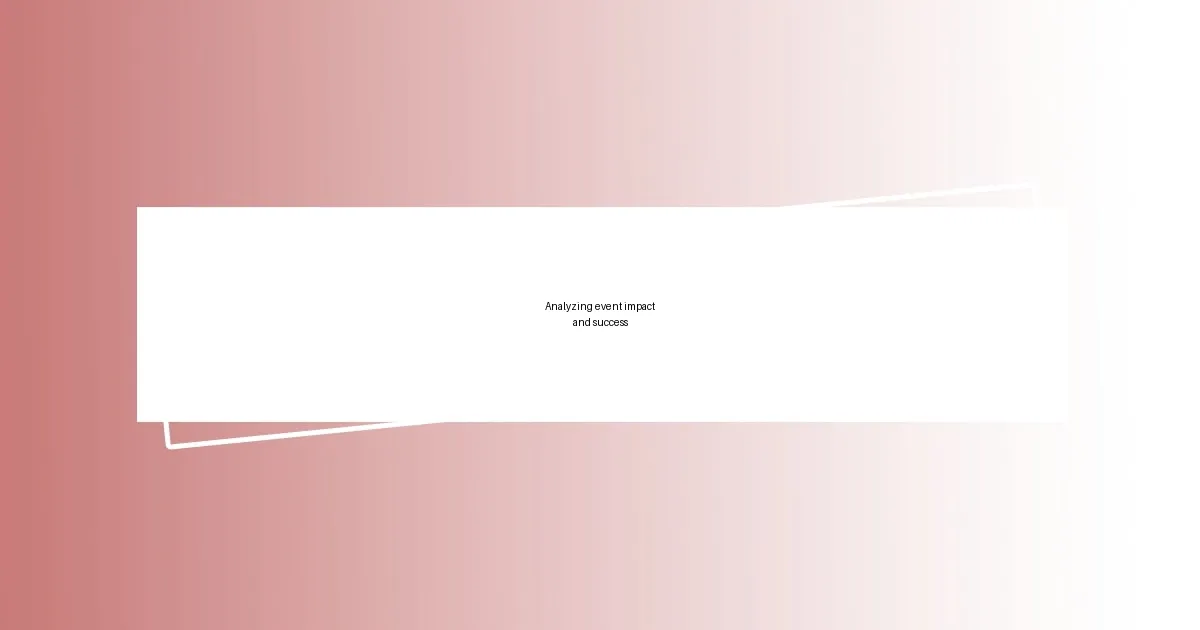
Analyzing event impact and success
Analyzing the impact and success of an event often involves looking at both the tangible and intangible outcomes. I recall covering a local sustainability fair where the organizer shared that attendance exceeded expectations by 30%. They highlighted not just the numbers but how those attendees engaged with different booths and workshops. It was incredible to see how one successful event could ripple through the community, sparking conversations about sustainable practices long after the fair ended. Don’t you agree that measuring success goes beyond just attendance numbers?
Equally important is gathering feedback from attendees, which can reveal deeper insights. After a poetry reading I covered, I asked several participants what the event meant to them. Many shared that it provided a space for sharing their own stories, highlighting how events can foster connection and vulnerability. It made me realize that the emotional impact of an event is sometimes more telling than the logistical achievements. How often do we consider the personal stories that emerge from our coverage?
Finally, I’ve found that analyzing event success requires a retrospective look at the broader community impact. During a charity gala for a local animal shelter, I noticed how not only did they exceed their fundraising goal, but also how it galvanized community support for pet adoption rates. I later learned that several pets found homes because of the exposure from the event. It struck me how a single night of dedication can lead to lasting change. Isn’t it truly meaningful to see the real-world effects of our local events?












